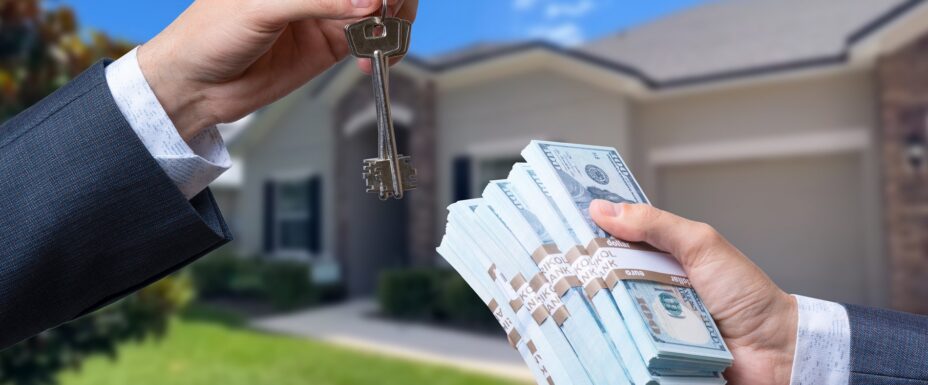Can You Sell A House With A Lien On It?
Reviewed by: Brandon Brown
When you’re struggling financially as a homeowner, you often look to your greatest asset: your home. With options to refinance, take out a second mortgage, or even sell your home—a house almost feels like a swiss army asset.
But if there’s a property lien on your home, the option of selling your home immediately becomes more complex.
So, can you sell a house with a lien on it? In short, yes. However, the home sale process isn’t straightforward.
Below, we’ll explain what a property lien is and provide a step-by-step guide for selling a house with a lien.
What is a Lien?
A lien is a legal claim to your real estate property that an individual or entity places on your home when you owe money. Liens allow indebted parties to recoup their money when you sell your home or lose it through foreclosure. Since liens are on public record, anyone can look them up, including a potential home buyer and their mortgage lenders.
According to the National Association of Realtors, 11% of closing delays are due to lien-related issues.1 This puts many homeowners in precarious positions when it comes time to put their homes on the market.
Can You Sell Your House With a Lien On It?
As noted above, yes, you can sell a home with a lien on it. You just need to complete a few steps first. Here’s a four-step process for selling your home with a lien.
Step 1: Identify All of Your Liens
You may have an existing lien on your home without realizing it. You can find out if your property has any liens by pulling up your home’s title records at your local county records office, either in person or on their website. You can also have a professional title company conduct a title search of your home.
Once you’ve identified your liens, you’ll want to find out what they’re for. After all, not all liens work the same way. The process of getting a lien removed can vary, depending on the creditor and the type of unpaid debt.
The Different Types of Liens
The world of liens can be quite intricate. Some liens take precedence over others, meaning lenders are paid back in a certain order when there are multiple liens on a single home.
To wit, here are a few of the most common types of home liens:
-
Mortgages – When you take out a mortgage loan, your lender places a lien on your property to ensure they’ll get paid back. This lien transforms your house into collateral for the loan. Once you finish paying off your mortgage, either by making all of its monthly payments or selling your home, the mortgage lien will be removed. For further information on if you can sell a house with a mortgage, make sure to check out our blog to familiarize yourself with the process.
-
Second mortgages – Home equity lines of credit and home equity loans are considered second mortgages since they’re secured by your home too. Like primary mortgages, second mortgages place liens on your home.
-
Tax liens – Just like mortgage lenders, tax collectors are always eager to take a cut. If you don’t pay your taxes on time, the IRS can place a federal tax lien on your property.
-
HOA liens – If you live within a community that has a Homeowners Association (HOA), you may owe anywhere from $100 to $1,000 a month in HOA fees.2 Failing to pay these fees could result in an HOA lien.
-
Mechanic’s liens – A mechanic’s lien, also known as a contractor’s lien, can be placed on your home by someone who did licensed work on your house if you don’t pay them on time.
-
Judgment liens – A judgment is a decision rendered by a judge in a civil court. If you’re involved in a court case and the decision requires you to pay someone money, the judge may issue a lien on your home to ensure the damaged party gets paid.
-
Child support and alimony liens – A judge can also apply a lien on your home if you owe outstanding child support or alimony payments.
Which Liens Take Precedence Over Others?
In general, mortgages typically hold the primary lien position. This means that your mortgage lender will get paid first when you sell your home—before you or any other creditors. The only exception is if you have federal tax liens too. In this case, the government can take over the primary lien position.
Secondary liens get paid after the primary lien. If your home’s sale proceeds don’t cover them in full, your secondary debtors may be out of luck. That’s why the secondary lien position is considered riskier and less desirable for creditors.
Step 2: Resolve The Lien and Clear The Title
Once you’re aware of your liens, you need to find a way to clear your home’s title. Otherwise, it may be difficult to find a home buyer when you list your home for sale.
The reason? Liens are attached to the property’s title, rather than your name. In turn, if you sell a home with an unpaid or outstanding lien on it, your buyer will inherit the responsibility for the outstanding debt.
But, what about selling a house to a cash buyer? Even as cash offers become more common, most homes are still purchased using mortgages.3 Unfortunately, mortgage lenders rarely approve applications for homes with liens attached due to their increased risk. With this in mind, trying to sell your home with unpaid liens can reduce your potential pool of home buyers considerably.
How to Resolve Your Liens
If you want to expand your potential pool of home buyers, it’s a much better idea to settle your liens beforehand.
Here are a few methods for doing so:
-
Use your savings to pay off your outstanding debt before listing your home – If you have the money, paying off your liens upfront is the best option. This way, your buyer won’t uncover any liens that may lead them to cancel the sale, enabling you to enjoy a streamlined escrow and swifter closing process.
-
Use the proceeds of your home sale to satisfy the lien – You may have a lien because you couldn’t afford to pay your debts in the first place. If you’re still in a precarious financial position, you can use the proceeds from the sale of your home to settle your liens instead. To use this method, simply ask your creditors for payoff letters outlining your debts and share them with your escrow agent. Your agent can roll the total lien amount into the closing costs you’ll owe once you receive the money from the sale. For example, let’s say you owe $100,000 on your mortgage and $20,000 in unpaid property taxes. After selling your home for $300,000, you can use the first $120,000 to pay off your liens and pocket the remaining $180,000 for yourself.
-
Negotiate your liens with your creditors – Creditors place liens on your property because they want to get paid back. Knowing this, you may be able to work out a reduced payment plan with certain outstanding lien-holders. Just let your creditors know what you can afford and see if they’d be willing to adjust your debt balance accordingly. Secondary lien-holders, in particular, are often willing to take something rather than nothing. On rare occasions, you may even be able to get your lien dismissed altogether.
-
Contest inaccurate liens in court – If you believe a lien was recorded inaccurately, you can try to get it removed by disputing it in court. If your creditor fails to prove the lien’s validity, it may be dismissed and removed. Just keep in mind that you may need to hire an attorney to assist with this process.
As you can see, there are several ways to pay off your liens and clear your home’s title. The option you choose, then, is determined by your current financial situation.
Step 3: Request Lien Release Documents For Your Records
Liens don’t get erased from your home’s title automatically just because they’re paid. Instead, your creditor must file a request to have the existing lien removed.
You’ll know that your creditor has released you from the lien when you receive a lien release statement, also known as a lien discharge, lien termination, or satisfaction of mortgage.
If you haven’t received this document, make sure to contact the creditor and find out if they’ve filed the lien release request on their end.
Step 4: Consider Selling Your Home For Cash
After completing the steps listed above, you can go ahead and list your personal property for sale. But what if you want to skip these steps and sell your home right away instead?
If so, you may want to set your sights on cash buy-outs. Since cash purchases don’t have to deal with the constraints of working with a mortgage lender, they may be willing to purchase your real estate property as is, liens and all. If this is a route you are considering, make sure to check out our blog to discover additional insights on negotiating a cash offer on a home.
Sell Your Home Swiftly For Cash With FlipSplit
As you can see, selling a home with a lien can present some challenges. Fortunately, there’s an easy solution: Just sell your home to a cash buyer, like FlipSplit.
At FlipSplit, we buy houses in Southern California for cash. Our closing time can take as little as three days. Since we’re a cash buyer, we don’t mind if your home has liens. We’re happy to pay off your liens upon closing and adjust your sale proceeds accordingly. Once we buy your home, we’ll fix it, flip it, and share the profits with you fifty-fifty.
Want to learn more about our streamlined home-buying process? Reach out to us today and request an offer.
Sources:
- National Association of REALTORS Research Group. Realtors Confidence Index Survey. https://cdn.nar.realtor/sites/default/files/documents/2022-01-realtors-confidence-index-02-18-2022.pdf
- Investopedia. Homeowners Association (HOA) Fee. https://www.investopedia.com/terms/h/homeowners-association-fee-hoa.asp
- Bloomberg. Home Buyers Paying Cash Are Dominating the Property Market in These Cities. https://www.bloomberg.com/news/articles/2021-07-15/real-estate-market-dominated-by-cash-buyers-in-2021?leadSource=uverify%20wall

Reviewed by: Brandon Brown
As a long-time Asset Manager, Investor, Real Estate Agent, and Broker/Owner of BayBrook Realty in Orange County, Brandon Brown is one of FlipSplit’s lead Real Estate experts. Having worked on over 2,000+ real estate transactions, Brandon brings a depth of knowledge that ensures clients are appropriately treated with honesty and integrity. His insights and advice have been published in numerous blogs beyond FlipSplit, and he keeps a close eye on market trends and statistics, which are updated weekly on his social media pages. Outside work, you can find him participating and serving at church, cycling, mountain biking, surfing around Orange County and beyond, and enjoying time with his wife and two daughters.










